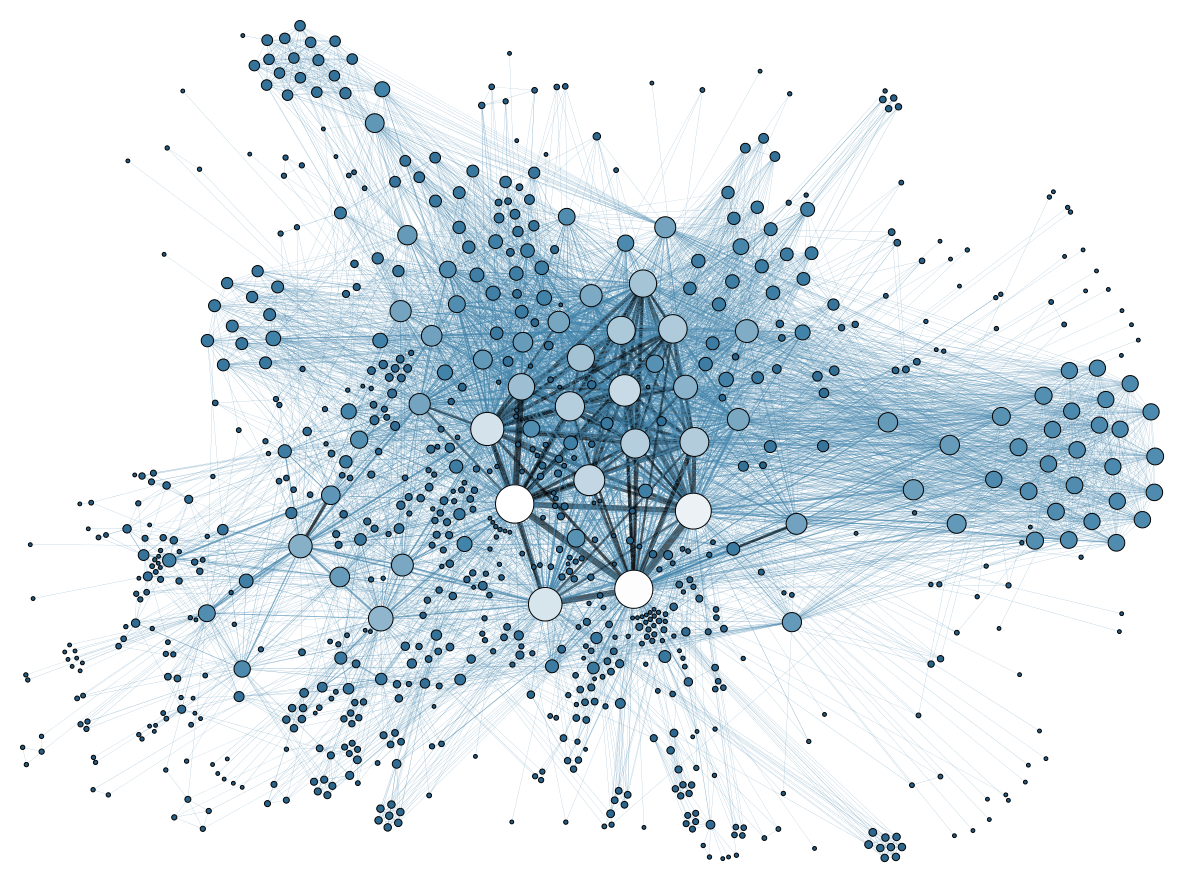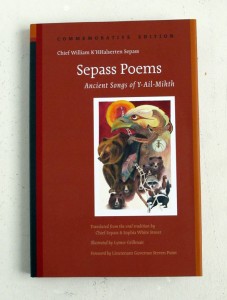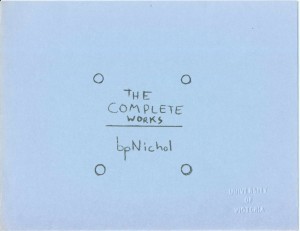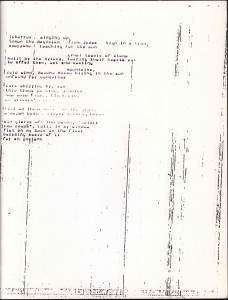Archives
Archive for April, 2014
April 30, 2014
Looking for Signposts
One of Editing Modernism in Canada’s primary objectives is “to train students and new scholars using experiential-learning pedagogies.” In an academic job market where the digital humanities seem to be opening up a new field into which young scholars can move, but where there still aren’t enough jobs to go around, and in a world when many of us pursue graduate degrees knowing that the professoriate isn’t for us, to what end is EMiC training emergent scholars? Where are we ending up? And how does the training we’re receiving through EMiC help us get there?
No longer the new kid on the block, EMiC has been around long enough to have trained and graduated dozens of students, many of whom are out in the world doing fascinating things that aren’t professorial. There’s Meagan Timney, EMiC’s first postdoc and a senior product designer at the e-reading company Inkling. There’s Katherine Wooler, the Museum and Communications Coordinator for the Nova Scotia Sport Hall of Fame. There’s Gene Kondusky, who is a high school teacher in Manhattan. There’s Reilly Yeo, who is the Managing Director of Open Media and a facilitator with Groundswell Grassroots Economic Alternatives. There’s me, Research Officer in the Faculty of Graduate Studies at York University. And there are all sorts of others. We are current EMiC fellows and EMiC alumni, and we owe our success, in some part big or small, to the skills, training, and mentorship we received through EMiC.
In an ongoing series of posts on the EMiC blog, we’ll be talking about where we are now, how EMiC helped us get here, and how we view the relationship between digital humanities scholarship/training and the #alt-ac and #post-ac tracks. But to get us started, I’d like to feature an article by one of my #alt-ac icons, Katina Rogers, who started out as a PhD in Comparative Literature at the University of Boulder, and is now the Managing Editor of MLA Commons, the MLA’s alternative digital press and scholarly network. You might already know it, or its sister MediaCommons, started by Kathleen Fitzpatrick and the home of Bethany Nowviskie’s #Alt-Academy project. In her recent essay for #Alt-Academy, “Discerning Unexpected Paths,” Katina explores her own journey into the #alt-ac world, and her work with the Scholarly Communications Initiative in analyzing how others like me have ended up there with her. As Katina notes, “The problem with signposts on the alternative academic track is that they aren’t where you expect them to be,” which makes the journey both exciting and unpredictable. Instead of the straight line from PhD to t-t, moving onto the #alt-ac track looks rather more like the social network graph above. You can read the entirety of Katina’s essay here, and keep your eye on this space for discussions of the unexpected paths taken by EMiC fellows past and present.
April 25, 2014
Returning Sepass Poems to their Oral Tradition
EMiC has funded a project to create an audio edition of Sepass Poems, and Ann Mohs of Longhouse Publishing has been overseeing the recording of the poems, which will be released later this year. The recordings are connected to a larger UBC initiative with which EMiC is affiliated. Ann has three books and 30 years of aboriginal connections informing her work on this project and she believes in producing high quality and meaningful publications. Below she gives an introduction to the project and her experience organizing it:
I have been given a very honourable place to be the publisher of the Sepass Poems, and recently to bring back the 16 Sepass Poems to their traditionally oral presentation—the way they were spoken back in William Sepass’ day (before 1943). This has been a joy, indeed.
Over the past year and a bit, an all-native talent cast has been recording in a small secluded studio in Burnaby for the production of the audio CD of the 16 Sepass Poems, Ancient songs of Y-Milhth. Longhouse Publishing has provided the direction and organization, and EMiC has generously provided the funds.
Longhouse Publishing gratefully took on the audio CD project as a natural extension of the book—a lovingly published 3rd edition sponsored by generous corporate funders with vested interests in things Aboriginal. After it caught the interest of Dr. Dean Irvine, and he brought up the query of the audio CD and the funds to achieve it, Longhouse Publishing moved quickly to make it happen in the right way. Thank you, Dean!
A little about the Poems: William Sepass recited these 16 poems from memory—training as orator from childhood—in the traditionally oral way. This set of 16 poems speaks of the beginning of the world, how everything came to be, and incorporates in story-form the physical, spiritual, and social attributes played out by humankind in its development along the way. In the oral tradition—unlike print—these stories take on an amazing dimension, and will delight all listeners. Traditionally and culturally, they were meant as teachings to be spoken and listened to!
I am so grateful for the contribution and opportunities EMiC has given Longhouse Publishing through Dr. Dean Irvine. He is the Sepass family’s Champion, and I know they, too, are grateful for the recognition of importance that Dean has placed on the Poems. Without this support, there would only be the desire to hear the poems in the oral tradition—not the opportunity to hear them!
April 22, 2014
Digital Editions @ DHSI@Congress
For anyone who would like to register for the Digital Editions workshop on Friday, May 30th, please see the registration details below. This afternoon workshop will feature the latest iteration of the Modernist Commons. If you can’t make it to DHSI in Victoria, come to Congress at Brock for a preview of EMiC’s digital repository and editorial workbench. Those of you who have seen earlier versions of the Modernist Commons will be interested to see the strides we’ve taken from prototype to production platform over the past few years, and those who are new to EMiC and its infrastructure development can learn how to take advantage of the freely available content-management, optical character recognition, TEI and RDF markup, versioning, collation, and visualization features that the new platform has to offer. If you can make it to DHSI, the Modernist Commons will be demoed for anyone who wants to drop in on Susan Brown’s CWRCshop course.
__________________________
DHSI@Congress 2014 (28-30 May 2014)
The DHSI@Congress is a series of 2.5 hour workshops for scholars, staff, and students interested in a hands-on introduction to the ways that traditional and digital methods of teaching, research, dissemination, creation, and preservation intersect and enhance one another. The workshops are built on the community model of the Digital Humanities Summer Institute at the University of Victoria, which connects Arts, Humanities, Library, and Archives practices and knowledge in a digital context. The workshops are modular and may be taken individually or as a self-directed course of investigation. We invite you to register through the Congress2014 website for any and all workshops that engage your interest.
DHSI@Congress is brought to you by the DHSI in partnership with CSDH/SCHN and the Federation for the Humanities and Social Sciences. DHSI@Congress participants must be registered for Congress in order to take part in the workshops. The plenary is free and open to those not registered for Congress.
For more information, feel free to contact the DHSI@Congress organizer, Constance Crompton, at constance.crompton@ubc.ca or follow us @DHInsitute on Twitter.
To register, please visit the Congress registration page (https://www.regonline.ca/Register/Checkin.aspx?EventID=1526736).
April 17, 2014
TEMiC in Review: A “Smorgasbord” of Meaningful Discussions
Leading up to TEMiC 2014, I will be sharing some comments from last year’s participants. This week, Graham Jensen, PhD student at Dalhousie University, writes about his experience at last year’s TEMiC training event in Kelowna, BC:
This past summer, I was fortunate to be one of the participants in EMiC’s summer institute (TEMiC) in beautiful British Columbia. The week-long course consisted of a series of lively seminars; afternoon workshops and presentations by a first-class line-up of artists and scholars; and both on- and off-campus readings by some of Canada’s most renowned or up-and-coming poets (imagine Erín Moure, Sonnet L’Abbé, Shannon Maguire, kevin mcpherson eckhoff, George Bowering, Frank Davey, Daphne Marlatt, Sharon Thesen, and Fred Wah gathered together in a single room). Against my better judgment, perhaps, I feel strangely compelled to use the word “smorgasbord” to describe TEMiC. But again, its great value consisted not only of the artistic, poetic, and scholarly delights it consistently placed on the proverbial table, but of the diverse artists, poets, students, and scholars it brought together around that table for meaningful discussions—of art, of Canadian poetry and poetics, and of editorial theory and practice in a wide variety of creative as well as critical contexts.

(UBC Okanagan Campus)
In partnership with EMiC, I am hoping to produce a digital edition of one of Louis Dudek’s long poems, and what I learned during, or in preparation for, my week in Kelowna will undoubtedly inform this project. In addition, my exposure at TEMiC to digital resources such as SpokenWeb has already begun to inform my own research and writing. I am extremely grateful to EMiC for its support, to the UBCO for being a gracious host, to the amazing speakers and poets who rained gold down on our heads every day, and to Karis Shearer and Dean Irvine for making the event possible in the first place.

(Louis Dudek)
April 16, 2014
Announcing Modernism: Keywords
A ground-breaking addition to modernist studies, Modernism: Keywords is a collaborative work drawing on the research of twelve faculty and (former) graduate students, all initially located at the University of Toronto. Keywords—an approach pioneered by Raymond Williams—charts words with divergent, conflicted, and changing meanings, not to fix definitions but to use unsettled definition as a key for understanding cultural controversies and debates. Entries in this book range from possibly unexpected words like Einstein, Hamlet, and rhythm to distinctively modernist words like advertising, propaganda, and shock. Of particular interest to members of EMiC, the mix of modernist voices includes Canadians Francis Marion Beynon, E. K. Brown, Richard Bucke, Morley Callaghan, Annie Charlotte Dalton, Pelham Edgar, John S. Ewart, Northrop Frye, W. Eric Harris, Stephan Leacock, Wyndham Lewis, Dorothy Livesay, Hugh MacLennan, Marshall McLuhan, Lucy Montgomery, Emily Murphy, Charles G. D. Roberts and A. J. M. Smith, with quotations as well from the Balfour Declaration, the Charlottetown Guardian, and the Canadian Magazine of Politics, Science, Art and Literature. With the inclusion as well of writers from Australia, the Caribbean, India, New Zealand, and South Africa, Modernism: Keywords advances a paradigm of modernism as a cross-nation web. The accessible entries should appeal to a wide range of readers, from non-academics to research specialists. You can read more about this work, including an excerpt, on the Wiley Blackwell page. A 20% discount is currently available, for either hardcover or ebook from the Wiley site: go to www.wiley.com and enter the code LTR14 at checkout. The Amazon site offers discounts as well, for hardcover and Kindle formats. The book is also available from Kobo, and from iTunes for iPhone, iPad, iPod touch, and Mac.
Posted by Melba Cuddy-Keane
April 11, 2014
Conference in Honour of the Centenary of the Birth of George Whalley
Plans are in the works for a three-day conference at Queen’s University to celebrate the centenary of George Whalley’s birth on 25 July 2015. Each one of the three days is meant to stand alone (though some people may wish to attend for two or three days), and the subjects have been chosen to recognize different aspects of Whalley’s life and work.
Friday, July 24 – Romanticism and Aesthetics
Saturday, July 25 – George Whalley, the Man and the Legend
Sunday, July 26 – the 60th Anniversary of the Canadian Writer’s Conference, held at Queen’s University, 28-31 July 1955. (Whalley co-organized the event and edited the conference proceedings, entitled Writing in Canada).
Calls for papers will be made in the near future. The intention is for the sessions on the first and third days to address the topics, not necessarily Whalley and his work. For the second day, there will be papers on at least a few of the following subjects: Whalley’s poetry, his writings on John Hornby and Edgar Christian, his translation of Aristotle’s Poetics, Poetic Process, his love of music, his military career, and his contributions to CBC radio, among other things. Michael Ondaatje and Elizabeth Hay have accepted invitations to speak on the second day.
A banquet in honour of Whalley will be scheduled for Saturday evening and may be held at the HMCS Cataraqui – where Whalley was the commanding officer in the early 1950s – in a room with a beautiful view of the water. The organizers will try to arrange a performance of music from the Romantic period for later Saturday evening in the Bader Centre.
The conference is not meant to be narrowly academic. Family, friends, former colleagues and students, as well as people in the Kingston community are all welcome to attend.
Questions and suggestions are welcome: email me at michael.disanto@algomau.ca.
April 8, 2014
Creating Your Own Digital Edition Website with Islandora and EMiC
I recently spent some time installing Islandora (Drupal 7 plus a Fedora Commons repository = open-source, best-practices framework for managing institutional collections) as part of my digital dissertation work, with the goal of using the Editing Modernism in Canada (EMiC) digital edition modules (Islandora Critical Edition and Critical Edition Advanced) as a platform for my Infinite Ulysses participatory digital edition.
If you’ve ever thought about creating your own digital edition (or edition collection) website, here’s some of the features using Islandora plus the EMiC-developed critical edition modules offer:
- Upload and OCR your texts!
- Batch ingest of pages of a book or newspaper
- TEI and RDF encoding GUI (incorporating the magic of CWRC-Writer within Drupal)
- Highlight words/phrases of text—or circle/rectangle/draw a line around parts of a facsimile image—and add textual annotations
- Internet Archive reader for your finished edition! (flip-pages animation, autoplay, zoom)
- A Fedora Commons repository managing your digital objects
If you’d like more information about this digital edition platform or tips on installing it yourself, you can read the full post on my LiteratureGeek.com blog here.
April 3, 2014
The bpNichol.ca Project: An Archive for Ephemera
*This post was written by Gregory Betts
In the avant-garde circuitry of Canadian small press publishing, the values of official verse culture are often inverted and reprogrammed. Whereas it seems natural in mainstream culture to value massive distribution, huge-scale production, and award-winning products, the authors who make the small press scene a coherent milieu are more likely to privilege precious objects that are individually made, circulated, and valued. This raises no problems for book reviewers or critics – they simply ignore what is sneeringly dismissed as “ephemera” – but it does raise an important problem for scholars of the avant-garde in the very limited access to primary materials. These items are often made in minuscule print-runs that quickly disappear into eccentrically organized private collections and only rarely get archived and made publicly available.
bpNichol is a definitive case of this type in Canada. On the one hand, his official verse culture position is convincing and significant: he published 24 books (depending on how you count them), many of which have been reprinted and remain in print, won the Governor-General’s Award, and has had the honour of an award and even a city road named after him. Two documentary films have been made of his work and influence, and a musical theatre interpretation of his collaborative sound poetry toured Canada in 2011. Outside of the spotlight, however, he also published thousands of “ephemeral” literary objects, including chapbooks, broadsides, comics, pillows, balloons, and much much more. Moreover, it is certainly the case that his ephemeral publications are more central to his poetics than his recognition within official verse culture. As the mark of an avant-garde reversal, his ephemera functions as a, if not the, central manifestation of his literary oeuvre.
The exquisite nature of the materiality of these textual objects presents a subsequent problem in attempting to address or consider the abundance of limited-run editions of his works. Reproductions or transcriptions come with the great loss of all the information encoded into the production choices made for his handmade works. How can one anthologize a two-page chapbook folded over in blue paper that sits small in the hand, for instance, or a single page with an enormous square cut out when the accompanying text of both refer to and depends upon those irreconcilable material features? As Lori Emerson and Darren Wershler write in their “Notes on the Poems” to The Alphabet Game: a bpNichol Reader, “Nichol’s print work demonstrates a particular and exacting commitment to the materiality of the printed page […] Attempting to fit such a heterogeneity into the framework of any book becomes what Nichol referred to in his own practice as translation. Translation never produces an exact equivalence” (318). For this reason, scholars of Nichol, and by extension of most avant-garde writers, must overcome the boundary of access to these rare and precious objects that evade the searching eye by nature.
What’s a poor scholar to do? Archives collect these objects, but struggle with the burden of locating and affording them. Scholars have to travel to incomplete archives, and are dependent on raising funds for that travelling to complete their work. In light of these fundamental problems, the digital facsimile reproduction represents an imperfect solution. They, too, are compromised translations of the work; no mere screen will replicate the strained feel of opening a staple-bound book. They do, however, present a unique opportunity for capturing the material presence of an avant-garde work. You can see the rust of the staples. You can see the inkmarks pressing through thin paper.
So just scan and dump them on the net? There are a number of digital archive models, and even a number of digital archive models for bpNichol’s work.
There is the PennSound archive that hosts .mp3 files of Nichol’s sound work and readings: http://www.writing.upenn.edu/pennsound/x/Nichol.php. These works are all presented with the permission of the Nichol estate, and are assembled haphazardly by the availability of recorded material and the willingness of volunteers to digitize and post work. Only limited information about the material is presented in the accompanying notes and descriptions.
There is the Ubu.com archive that presents scanned versions of complete texts: http://www.ubu.com/vp/bpNICHOL.html. These works are not presented with the permission of the Nichol estate; they are pirated editions. As with PennSound, they too are assembled haphazardly by the interests and availability of volunteers and come with even less information on each work.
Another model is provided by poet and publisher jwcurry with his Beepliographic Cyclopedia. While the Beepliography is primarily an offline project, curry uses digital facsimile to present individual Nichol textual objects as a Flickr photostream of (at present) 3, 477 photos: https://www.flickr.com/photos/48593922@N04/sets. Unlike the other two digital Nichol archives, the Beepligraphic Cyclopedia does not present entire works. Instead, each photo includes bibliographic information of a particular object and material evidence of its publication. Through this archive, you can learn about thousands of Nichol projects and to a certain degree see what each of them look like. It is uncertain whether these facsimiles are reproduced with the permission of the Nichol estate.
Beyond Nichol projects, American scholar and poet Johanna Drucker’s Artists Books Online presents a compelling example of a digital archive built around facsimile reproductions: http://www.artistsbooksonline.org/. Her model includes extensive notes about each entry, and full facsimiles of the works.
The bpNichol.ca digital archive portends to build from these models into a more comprehensive, more systemic record of works. With the permission and active support of the Nichol estate, the website aims to become the largest repository of complete works, photos, audio and video files on the internet. Even though the website is currently not available, previous incarnations of the website have already created an enormous database of digital facsimiles and documentary materials that await resurfacing. The ultimate ambition of the project, however optimistic that may be, is to create a complete digital set of Nichol works. The project will also include posthumous publications, previously unpublished works from the archives, and, eventually, critical responses to Nichol’s work.
Right now, the bpNichol.ca archive is not available. We are in the process of migrating to a newer version of the Drupal content management software – revealing a poignant hazard of digital life; the speed of anachronism in computers. As we update, we will be adding in new citations extensions that will allow us to capture historical information about the creation of a work and to associate multiple creative works with a single file, working under the assumption that most works contain a network of creative acts and incumbent copyrights. Reflecting the full nuance of digital publishing, we are working to allow artists (and rights holders) to better articulate their intentions for the creative use of their work.
Why is that a concern of the digital archive? Digital archives present copies of works in a way that is decidedly different from scholarly digital editions. Such projects work from primary materials and re-render original works through a systematic editorial process. A digital archive, in contrast, aims to facilitate editorial and pedagogical engagement with primary works. Eventually, scholarly digital editions might be developed, but that is not the current ambition of the website. Establishing and clarifying the copyright implications and boundaries of each work, however, will simplify the process for editors and scholars alike.
What’s next? After the current round of upgrades, the website will be relaunched hopefully in the Fall with significantly more works digitized, easier means of navigating the materials, and greater capabilities for scholars and general readers. We want people to be able to access Nichol’s ephemera while compromising the spirit of the original as little as possible. Ironically, though, the nature of the website is such that we will contradict the small press ethos by creating massive distribution and huge-scale production of Nichol’s work. In light of this contradiction, I take comfort from Nichol’s dictum that “language opens worlds, / little yields to unwilling readers” (“TTA 17”). Accordingly, everything on the website will be free, open, and awaiting your attention.
“everything at once
altogether
completely tangled together […]
everything at once
altogether & forgotten
completely remembered
thrown out” (“Extreme Positions” 4)
To commemorate the occasion of the website’s relaunch, on 7 November 2014, all of us associated with the project and many more will be gathering to celebrate what would have been Nichol’s 70th birthday at a one-day symposium at Brock University (in grateful affiliation with the EMiC project). The symposium will feature talks, small press workshops, roundtables, poetry readings, and more. Did somebody say Fraggle Rock dance your cares away party?



